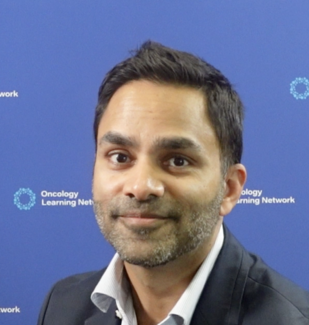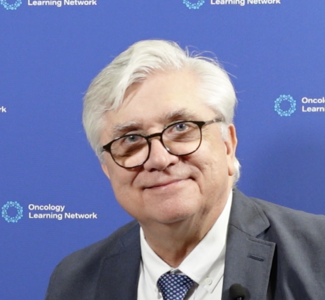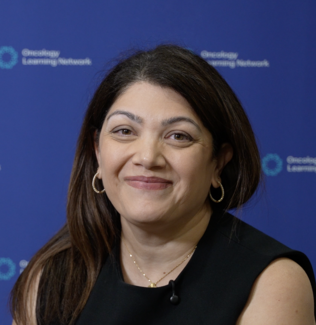Odronextamab Demonstrates Long-Term High Response Rates for Heavily Pretreated R/R Follicular Lymphoma: ELM-2
Stefano Luminari, MD, University of Modena and Reggio Emilia, Modena, Italy, discusses the results from a phase 2 ELM-2 trial evaluating the safety and efficacy of odronextamab, a CD20-CD3 bispecific antibody, for the treatment of patients with heavily pretreated relapsed/refractory (R/R) follicular lymphoma (FL) at a longer follow-up.
These data were presented at the European Hematology Association (EHA) 2025 Congress in Milan, Italy. The results of this analysis demonstrated deep and durable responses for odronextamab for patients who have R/R FL.
Dr Luminari stated, “In conclusion, with the updated results of the ELM-2 study for follicular lymphoma patient, we can confirm the excellent activity and very good safety profile of odronextamab. All this data represents a very strong rationale to further improve and to further investigate the role of this bispecific for the treatment of follicular lymphoma in this case, but also in other lymphoma settings, and in particular to move these agents into the phase of combination studies.”
Transcript:
Hello, my name is Stefano Luminari. I'm a hematologist at the research hospital and professor of medical oncology at the University of Modena and Reggio Emilia in Italy. I'm here at EHA in Milan to present the updated results of the ELM -2 study.
The ELM-2 study is a multi-arm phase 2 trial of relapsed/refractory lymphomas, which also included a follicular lymphoma arm, which has been already presented as preliminary results. The first results documenting high activity and efficacy, and a good safety profile of the agent, which prompted this drug to be approved in the peer community for the treatment of follicular lymphoma for patients who relapsed after 2 prior lines of therapy.
With these updated data, which are presented with an additional follow-up of longer than 2 years, now we have more robust data confirming the high activity of this agent in the setting of follicular lymphoma in relapsed/refractory cases. In terms of response, which was the primary study end point, the treatment is confirmed [to be] very active with the 74% rate of complete remission and with 80% of overall response in enrolled patients.
The updated follow-up also allowed to confirm the excellent progression-free survival (PFS) data, which are now reported with the median progression-free survival time of around 23 months, which is longer than the original 20 months median PFS reported in the first analysis of the study.
In terms of safety, the treatment is well-tolerated with no additional safety signals compared to the original report, and in line with the other similar reports from other bispecific antibodies in the same lymphoma subtype. The most frequent event was CRS; however, it was very limited to grade 1 and 2 cases. In particular, this good safety profile in terms of CRS was confirmed with the NOVA and the updated step-up, which was implemented after the enrollment of the first 68 patients in the ELM-2 study. The safety profile in terms of CRS is excellent, there were only 2 ICANS observed low-grade in the treatment.
Looking at the other events that were observed, we have to say that the study enrolled patients during the very bad time of the COVID pandemic. This is also why there were a significant number of patients who were affected by COVID and in some cases the COVID infection was high-grade, and, in some cases, this was also a cause of death. The safety profile of odronextamab in the ELM-2 study of follicular lymphoma was confirmed with the prior reassuring data, without any new signals.
In conclusion, with the updated results of the ELM-2 study for follicular lymphoma patients, we can confirm the excellent activity and very good safety profile of odronextamab. All this data represents a very strong rationale to further improve and to further investigate the role of this bispecific for the treatment of follicular lymphoma in this case, but also in other lymphoma settings, and in particular to move these agents into the phase of combination studies.
There is a multi-arm study, the OLYMPIA program, which is testing in randomized clinical trials, the efficacy of odronextamab, either alone or in combination with the chemo-free option, maybe lenalidomide, with other chemo-free option in the relapsed/refractory setting, or with immunochemotherapy in the frontline setting, trying to challenge the current standard of treatment and to demonstrate with robust activity data and efficacy data that this agent can represent a future improvement for the treatment of our clinical patients.
Source:
Luminari S, Taszner M, Chong G, et al. Long-term efficacy and survival outcomes with odronextamab for patients (pts) with relapsed/refractory follicular lymphoma (R/R FL): 2-year follow-up from the phase 2 ELM-2 study. Presented at EHA 2025 Congress. June 12-June 15, 2025; Milan, Italy. Abstract 4159312
















